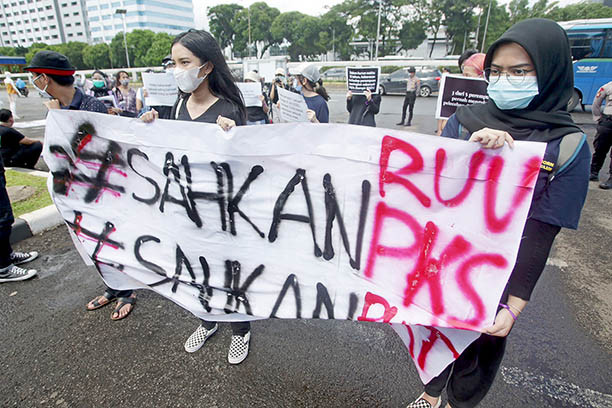Popular Reads
Top Results
Can't find what you're looking for?
View all search resultsPopular Reads
Top Results
Can't find what you're looking for?
View all search resultsHouse passes law to curb sexual violence
Legislation grants greater protection, access to funds for survivors.
Change text size
Gift Premium Articles
to Anyone
T
he House of Representatives passed a highly anticipated sexual violence bill into law on Tuesday, which provides a comprehensive legal framework for dealing with sexual violence, after nearly a decade of struggle to convince the political elite of the need for more robust forms of protection for survivors.
The law secured wide approval from lawmakers and the government in a plenary meeting witnessed by a broad network of women’s rights activists.
Willy Aditya, a Nasdem Party politician who also led the legislative working group to deliberate the bill, lauded the lawmaking process as a “model” for meaningful civic engagement.
“Even at the last second, we still welcomed public participation,” he said at the plenary on Tuesday.
The sexual violence bill was first formulated in 2014 by the National Commission on Violence Against Women (Komnas Perempuan), informed by the need to address rampant cases of sexual assault reported since the start of the decade.
The initial draft sought to include 15 different forms of sexual violence but was later whittled down to just nine when it was handed over to lawmakers in 2016, foreshadowing the uphill battle that awaited in a largely conservative country where sexual abuse is still widely regarded as a private matter.
For years, the bill repeatedly failed to be passed due to strong opposition from Islamic political parties, particularly the Prosperous Justice Party (PKS), which argued that the law would support the legalization of adultery and extramarital sex, as well as endorse lesbian, gay, bisexual and transgender (LGBT) relations – issues that are still widely shunned.
At one point during Tuesday’s plenary, PKS lawmaker Al Muzzammil Yusuf declared that the sexual violence law by itself would engender “dangerous meaning” if it was not supplemented by provisions on adultery or extramarital affairs in the ongoing deliberation of the Criminal Code revision.
“[We require] a complete bill that regulates all matters of decency,” he said.
Meanwhile, public appeals to pass the law for the sake of survivors tended to fall on deaf ears.
Serious efforts to fast-track the draft legislation only began in earnest this year, as policymakers held meetings that stretched into the weekend to answer an appeal by President Joko “Jokowi” Widodo in January to pass the bill.
House Speaker Puan Maharani, heir apparent to the Indonesian Democratic Party of Struggle (PDI-P) leadership, followed up on Jokowi’s statement by promising to have it passed in one of the legislative sitting periods this year.
Read also: Violence against women soars in 2021: Komnas Perempuan
Ray of hope
The law received wide public praise for including progressive provisions for protecting victims of sexual violence, including the imposition of restraining orders on the alleged perpetrator. It also acknowledges the unequal power relations between victim and perpetrator.
The newly passed law contains 93 articles and 12 chapters that cover everything from the types of sexual violence subject to the law and the integration of services to handle such cases, to defining the role of the family and the government in matters of prevention.
A broad spectrum of sexual violence acts was classified as a crime, such as physical and nonphysical sexual harassment, sexual torture, forced contraception, forced sterilization, forced marriage, sexual slavery, sexual exploitation and cyber sexual harassment.
The law also stipulates services to help victims recover from trauma, which will involve work by law enforcers and health workers, among others.
The government and lawmakers also sought to ensure that victims receive compensation from a victim trust fund, to be set up by the Finance Ministry.
The compensation fund will be built from fines charged to the perpetrator, but also from public donations, philanthropy and corporate social responsibility initiatives and nonbinding foreign aid sources, according to the law.
Victims can receive restitution in the amount determined by a court decision. If the fine is larger than what is owed to the victim, the difference is to be deposited into the victim trust fund.
“For restitution, if a perpetrator has insufficient assets, the state will provide compensation to the victim in accordance with the court's decision,” said Women’s Empowerment and Child Protection Minister Bintang Puspayoga.
Bintang said the government would issue implementing regulations to complete the law within three months after it is passed, either in the form of presidential regulations (Perpres) or government regulations (PP).
“We will communicate the contents of the law [...] so that it may always be used with the best interests of the victims in mind,” she told the press after the plenary meeting in Senayan, South Jakarta.
While the law excludes coerced abortion and provides little mention of rape, Law and Human Rights Deputy Minister Edward OS Hiariej said these points would be stipulated in the revision of the Criminal Code, which is scheduled for deliberation in June.










